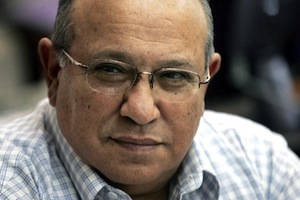Former Israeli Intelligence Chief Calls Military Action Against Iran "Stupid"
Featured Image
Today's top nuclear policy stories, events, and analysis with excerpts in bullet form.
Stories we're following today - Monday, May 9, 2011:
Former Israeli Spymaster Says Military Strike Against Iran Would Be ‘Stupid’ - The Associated Press [link]
- Israel’s recently retired spy chief says a military strike against Iran’s nuclear program would be “stupid,” Israeli media reported Sunday.
- Former spymaster Meir Dagan told a weekend conference that an effective attack on Iran would be difficult because Iranian nuclear facilities are scattered and mobile, Israeli media reported.
- Dagan also cautioned that a strike would be liable to trigger war with Iran and possibly Syria.
How to Cut the Military - Gordon Adams in The New York Times [link]
- A defense build-down is upon us and it provides a welcome opportunity to discipline the Pentagon. Admiral Mike Mullen, the Joint Chiefs chairman made the point: “The budget has basically doubled in the last decade. And my own experience here is that in doubling, we’ve lost our ability to prioritize, to make hard decisions, to do tough analysis, to make trades.”
- [We must] take a hard look at the next generation of nuclear programs — a new long-range bomber, a full replacement of ballistic missile submarines, and new designs for nuclear warheads — as we seek to curb global nuclear forces.
- There is a clear path to a disciplined defense budget and a well-managed build-down. It will not gut the military, but will leave a leaner, more focused force in place, while helping solve our nation’s fiscal crisis.
New Article: Russian Nuclear Forces, 2011 - Hans Kristensen for the Federation of American Scientists [link]
- We estimate that Russia currently has nearly 2,430 strategic warheads assigned to operational strategic missiles and bombers, although most of the bomber weapons are probably in central storage.
- Another 3,700-5,400 nonstrategic warheads are in central storage, of which an estimated 2,080 can be delivered by nonstrategic aircraft, naval vessels and short-range missiles.
- Another 3,000 warheads are thought to be awaiting dismantlement, for a total inventory of some 11,000 nuclear warheads.
- For the full report, click here
U.S. Raises Pressure on Pakistan in Raid’s Wake - David Sanger in The New York Times [link]
- President Obama’s national security adviser demanded Sunday that Pakistan let American investigators interview Osama bin Laden’s three widows, adding new pressure in a relationship now fraught over how Bin Laden could have been hiding near Islamabad for years before he was killed by commandos last week.
- They argued that the United States still regards Pakistan, a fragile nuclear-weapons state, as an essential partner in the American-led war on Islamic terrorism.
- As Leonard S. Spector, the director of the Washington office of the Monterey Institute’s nonproliferation center, said, “It is hard to abandon Pakistan because of the danger of the nuclear program and the need for help in counterterrorism.”
EVENT: Arms Control Association, "Reducing the Nuclear Danger: Next Steps on the Test Ban Treaty and Nuclear Arms Reductions"
- May 10, 9:00 a.m.-4:00 p.m.
- Ellen Tauscher, Undersecretary of State for Arms Control and International Security; Sen. Robert Casey (PA); Sen. Jeanne Shaheen (NH); and five other speakers
- At the Carnegie Endowment, Root Room, 1779 Massachusetts Ave., NW, Washington
-
Webcast beginning at 9:15 a.m. on the Arms Control Association website
Can We Unlearn the Bomb? - Michael Freedman in The Atlantic [link]
- In September 1992, the first President Bush declared a moratorium on nuclear testing. Policymakers have since decided that designing new weapons might lead to more proliferation.
- In the meantime, the U.S. does what's known as stockpile stewardship.
-
From the standpoint of U.S. strategy, however, there are other potential implications. Younger says other nations, such as Russia, continue to invest in new, modern designs and young nuclear designers. That encourages the passage of knowledge from one generation to the next.
Video Gallery: Nuclear Bomb Tests - The Atlantic [link]



